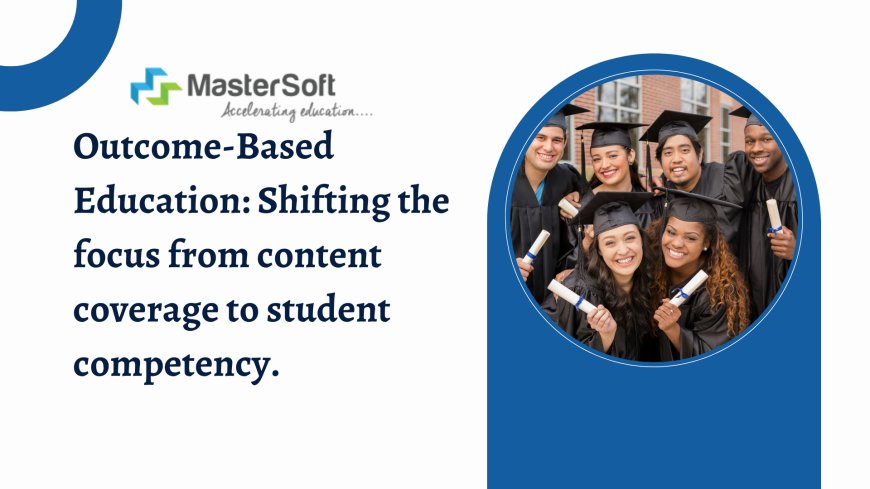How Outcome-Based Education Prepares Students for Success
Is traditional education falling short? Explore Outcome-Based Education (OBE), a transformative approach that equips students with the skills and knowledge to thrive in the 21st century.

In today's rapidly evolving world, traditional education methods are facing increasing scrutiny. The job market demands a new breed of graduates – individuals equipped not just with knowledge, but also with the skills and adaptability to thrive in a dynamic and unpredictable landscape. This is where Outcome-Based Education (OBE) emerges as a transformative approach, shifting the focus from rote learning to demonstrable skills and real-world application.
Rethinking Education: Moving Beyond Content Delivery
Traditional education often prioritizes content delivery over practical application. Students are expected to absorb vast amounts of information, with success measured primarily through standardized tests. However, OBE challenges this model. It emphasizes the desired outcomes of education, ensuring that students graduate with the skills and knowledge necessary to succeed in their chosen fields.
Unveiling the Core of OBE: A Focus on Measurable Outcomes
At its core, OBE is a student-centric approach that prioritizes demonstrable skills and competencies over rote memorization. Here's how it works:
- Clearly Defined Outcomes: OBE begins with clearly defined learning outcomes. These outcomes articulate the specific knowledge, skills, and attitudes students will acquire by the end of a course or program. These outcomes can range from technical skills like data analysis to broader competencies like critical thinking and problem-solving.
- Curriculum Alignment: The curriculum is meticulously designed to align with the predetermined learning outcomes. This ensures that all learning activities – lectures, assignments, projects, and assessments – actively contribute to the achievement of those outcomes.
- Assessment Redefined: Traditional assessments often focus on memorization and regurgitation of facts. OBE employs a wider range of assessment methods, including performance-based tasks, portfolios, and simulations. These assessments evaluate students' ability to apply their knowledge and skills to real-world situations.
The Benefits of OBE: Why It Matters
OBE offers a multitude of benefits for students, educators, and employers alike:
- Enhanced Student Engagement: By focusing on real-world application, OBE fosters a deeper understanding and a stronger sense of purpose in students. They are actively engaged in learning activities that have tangible outcomes, leading to increased motivation and improved learning results.
- Developing Critical Thinking Skills: OBE challenges students to go beyond memorization and develop critical thinking skills. They learn to analyze problems, formulate solutions, and adapt their knowledge to different situations.
- Bridging the Gap Between Theory and Practice: OBE emphasizes the practical application of knowledge. Students are encouraged to apply their learning to real-world scenarios through projects, simulations, and internships. This equips them with the necessary skills to hit the ground running upon entering the workforce.
- Improved Job Market Readiness: Employers are increasingly seeking graduates with demonstrable skills and the ability to solve complex problems. OBE graduates are well-equipped to meet these demands, as their education has been focused on developing the competencies valued by the job market.
- Continuous Program Improvement: OBE emphasizes ongoing evaluation and feedback. By analyzing student performance data, educators can identify areas for improvement and refine the curriculum to ensure it remains relevant and effective in preparing students for the future.
Fostering a Collaborative Learning Environment: Beyond the Classroom
OBE isn't just about curriculum and assessments. It fosters a collaborative learning environment that extends beyond the traditional classroom:
- Stronger Student-Teacher Interaction: The focus on student outcomes necessitates a more interactive and personalized learning experience. Educators work closely with students to identify individual learning goals and provide ongoing feedback to ensure they are on track to achieve them.
- Collaboration and Teamwork: OBE encourages students to collaborate on projects, participate in group discussions, and learn from each other. This fosters teamwork skills and the ability to communicate effectively – essential qualities for success in the 21st century workplace.
- Industry Partnerships: OBE fosters collaborations with industry professionals. Guest lectures, internships, and real-world project opportunities provide students with valuable insights into the professional landscape and the skills employers seek.
Embracing Innovation: The Ever-Evolving Landscape of OBE
The field of OBE is constantly evolving and adapting to the changing needs of the future workforce. Here are some trends to watch:
- Micro-credentials: OBE emphasizes the acquisition of specific skills. In the future, we may see a rise in micro-credentials that recognize students' mastery of specific competencies, allowing for more flexible and personalized learning pathways.
- Adaptive Learning: OBE can be further enhanced by adaptive learning technologies. These technologies can tailor the learning experience to individual student needs, ensuring a more personalized and effective learning journey.
- Technology Integration: Technology plays a crucial role in promoting collaboration, communication, and continuous assessment in OBE.
Conclusion: Shaping the Future of Education
Outcome-Based Education (OBE) is not just a new educational approach; it's a paradigm shift. It moves education beyond rote memorization and towards preparing students for the dynamic realities of the 21st century. By focusing on demonstrable skills, real-world application, and continuous improvement, OBE empowers students to become lifelong learners, critical thinkers, and adaptable problem solvers – all qualities essential for success in an ever-evolving world.
What's Your Reaction?

























